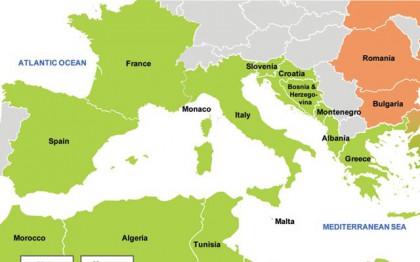
December 2012
 | December 2012 |
Preliminary summary of report findings focused on the Mediterranean | |
|---|---|
 During the meeting of the Priority Action Programme/Regional Activity Centre (PAP/RAC) National Focal Points, the results of the PEGASO ICZM stock-take for the Mediterranean were presented in draft form, including the background, scope and results. The stock-take results reviewed the formal management structure and institutional arrangements in the coastal zones of each country and the degree of ICZM implementation at different levels. The broad pattern that emerges is that there is a substantial level of activity overall, although the distribution is uneven both thematically and geographically. The broad areas which the stock-take suggested presented challenges were as follows: * Despite the wealth of information and experience across the region, there is an urgent need to share knowledge about different ICZM initiatives and approaches. There are successful examples of local actions. Participants at the meeting pointed out several issues, particularly regarding the reporters´ interpretation of the questions, the large amount of information to be compiled and analysed, and the need for clarification on some questions. Most of this work had been conducted by means of questionnaires and interviews to gain an overview of the situation in each country. Participants stressed the need to improve the approach and that a considerable effort should be put into gathering the vast amount of information required for adequate coastal planning and management. A final review of the findings was also presented and discussed with PEGASO participants during the VIC02. Taking into account the abundant comments and additional sources of information from both meetings, work is currently under way towards building a long-term evaluation tool to measure ICZM implementation and preparing the report to be officially adopted by the Conference of Parties to the Barcelona Convention. The recommendations set up the current coastal management reporting framework around three main issues: I. Technical: online platform/GIS with interactive maps to show implementation of the national strategies for ICZM; II. Capacity: the ability of stakeholders (Mediterranean and Black Sea National Focal Points) to participate and upload their own information through an open-access platform; III. Availability: involvement of national stakeholders to increase their participation, and greater process transparency and visibility to strengthen ICZM implementation. This report completes the first stage of the analysis of the current coastal management framework in the Mediterranean and calls for another specific round of consultation. A similar process is being conducted in the Black Sea. The PAP/RAC team will forward these findings to UNEP/MAP in the hope that they will provide a way forward to assess the next stage of implementation of the ICZM Protocol. More info: zeljka.skaricic@ppa.t-com.hr | |